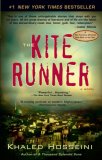Summary | Excerpt | Reading Guide | Reviews | Readalikes | Genres & Themes | Author Bio

Chapter One
December 2001
I became what I am today at the age of twelve, on a frigid overcast day in the winter of 1975. I remember the precise moment, crouching behind a crumbling mud wall, peeking into the alley near the frozen creek. That was a long time ago, but it’s wrong what they say about the past, I’ve learned, about how you can bury it. Because the past claws its way out. Looking back now, I realize I have been peeking into that deserted alley for the last twenty-six years.
One day last summer, my friend Rahim Khan called from Pakistan. He asked me to come see him. Standing in the kitchen with the receiver to my ear, I knew it wasn’t just Rahim Khan on the line. It was my past of unatoned sins. After I hung up, I went for a walk along Spreckels Lake on the northern edge of Golden Gate Park. The early-afternoon sun sparkled on the water where dozens of miniature boats sailed, propelled by a crisp breeze. Then I glanced up and saw a pair of kites, red with long blue tails, soaring in the sky. They danced high above the trees on the west end of the park, over the windmills, floating side by side like a pair of eyes looking down on San Francisco, the city I now call home. And suddenly Hassan’s voice whispered in my head: For you, a thousand times over. Hassan the harelipped kite runner.
I sat on a park bench near a willow tree. I thought about something Rahim Khan said just before he hung up, almost as an afterthought. There is a way to be good again. I looked up at those twin kites. I thought about Hassan. Thought about Baba. Ali. Kabul. I thought of the life I had lived until the winter of 1975 came along and changed everything. And made me what I am today.
Chapter Two
When we were children, Hassan and I used to climb the poplar trees in the driveway of my father’s house and annoy our neighbors by reflecting sunlight into their homes with a shard of mirror. We would sit across from each other on a pair of high branches, our naked feet dangling, our trouser pockets filled with dried mulberries and walnuts. We took turns with the mirror as we ate mulberries, pelted each other with them, giggling, laughing. I can still see Hassan up on that tree, sunlight flickering through the leaves on his almost perfectly round face, a face like a Chinese doll chiseled from hardwood: his flat, broad nose and slanting, narrow eyes like bamboo leaves, eyes that looked, depending on the light, gold, green, even sapphire. I can still see his tiny low-set ears and that pointed stub of a chin, a meaty appendage that looked like it was added as a mere afterthought. And the cleft lip, just left of midline, where the Chinese doll maker’s instrument may have slipped, or perhaps he had simply grown tired and careless.
Sometimes, up in those trees, I talked Hassan into firing walnuts with his slingshot at the neighbor’s one-eyed German shepherd. Hassan never wanted to, but if I asked, really asked, he wouldn’t deny me. Hassan never denied me anything. And he was deadly with his slingshot. Hassan’s father, Ali, used to catch us and get mad, or as mad as someone as gentle as Ali could ever get. He would wag his finger and wave us down from the tree. He would take the mirror and tell us what his mother had told him, that the devil shone mirrors too, shone them to distract Muslims during prayer. "And he laughs while he does it," he always added, scowling at his son.
"Yes, Father," Hassan would mumble, looking down at his feet. But he never told on me. Never told that the mirror, like shooting walnuts at the neighbor’s dog, was always my idea.
The poplar trees lined the redbrick driveway, which led to a pair of wrought-iron gates. They in turn opened into an extension of the driveway into my father’s estate. The house sat on the left side of the brick path, the backyard at the end of it.
From The Kite Runner by Khaled Hosseini, copyright © 2003 Khaled Hosseini, published by G. P. Putnam's Sons, a member of Penguin Group (USA) Inc., all rights reserved, reprinted with permission from the publisher.
Your guide toexceptional books
BookBrowse seeks out and recommends the best in contemporary fiction and nonfiction—books that not only engage and entertain but also deepen our understanding of ourselves and the world around us.